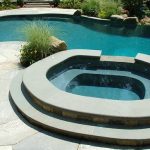Popular Environmentally Friendly Pool Trends for 2016
Well in advance of the summer 2016 season, homeowners are selecting the systems and products that will be incorporated in their new pool designs or added to their existing backyard swimming areas. Below we take a look at some of the pool maintenance and heating trends that will be among the most popular picks in the upcoming year.
Environmentally Friendly Pool Sanitation
Homeowners are increasingly seeking ways to reduce or eliminate chemicals used to keep their pools free of germs and safe for swimming. The most frequently used chemical to maintain clear pool and spa water and address contaminants including dirt, debris, and rainwater is chlorine. While it is relatively easy to use, long-lasting, and able to be stored for a long period of time, there are drawbacks associated with it. These include irritation to the eyes and skin and possible exacerbation of conditions such as asthma. Salt sterilization systems, which convert salt to chlorine naturally, have been on the market for years and are generally associated with fewer side effects than adding a chlorine-containing compound.
Another option for environmentally friendly sanitation that is becoming of interest to homeowners is natural pool design. As an alternative to chemicals, aquatic plants and biological filters are used to keep the water clean in this type of swimming area. While the body of water is constructed, the system that keeps it clean is a natural ecosystem. A smaller pool located next to the main swimming area provides all of the sanitation work, and clean water flows back into the main pool.
Solar and Geothermal Heating
When it comes to heating the pool, environmentally friendly options are increasing in popularity as well. Solar heaters are associated with low annual costs and are considered to be a cost-effective use of solar energy. Relying on the sun to maintain pool water temperature, many pools that have a solar heating system have sensors and automatic valves that help to control when water is diverted to the collector where heating takes place. When there is little difference between the temperature of the water in the pool and the collector, water is simply sent through the filters alone. When the pool is cooler than the collector, water is passed through the filter and the collector to be heated.
With geothermal heating, the weather is not a factor that affects pool temperature. Though it is highly efficient, solar heating systems may require a back up heating source if the weather does not cooperate. Since geothermal heating relies on the temperature of the earth to heat pool water, it is a more reliable source of heat, since this temperature is relatively constant a few feet below the surface.
If you are interested in cutting pool maintenance costs and ensuring that your NYC luxury swimming pool area has less of an impact on the environment, options are on the rise. With the popularity of environmentally friendly products and systems, now is a good time to explore the range of sanitation and heating choices that are available.




